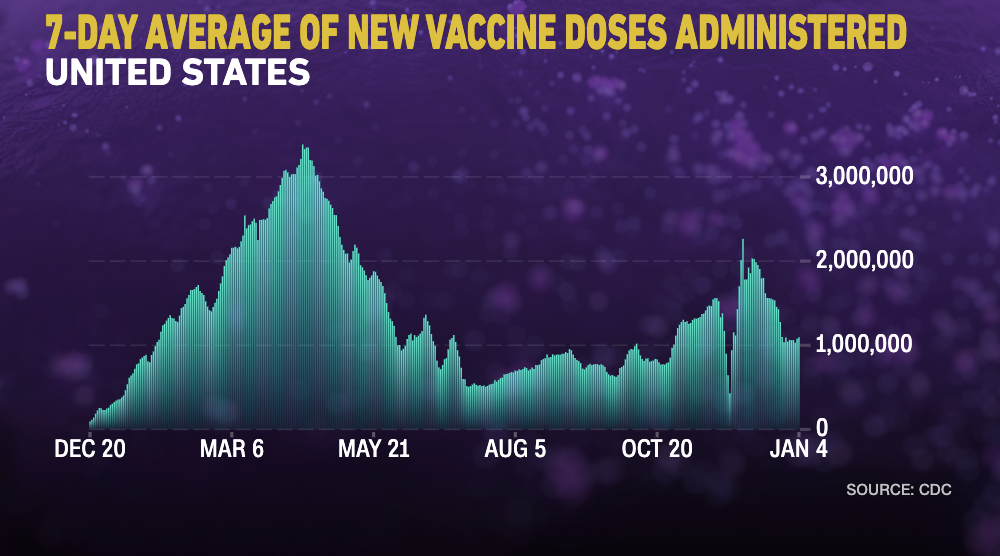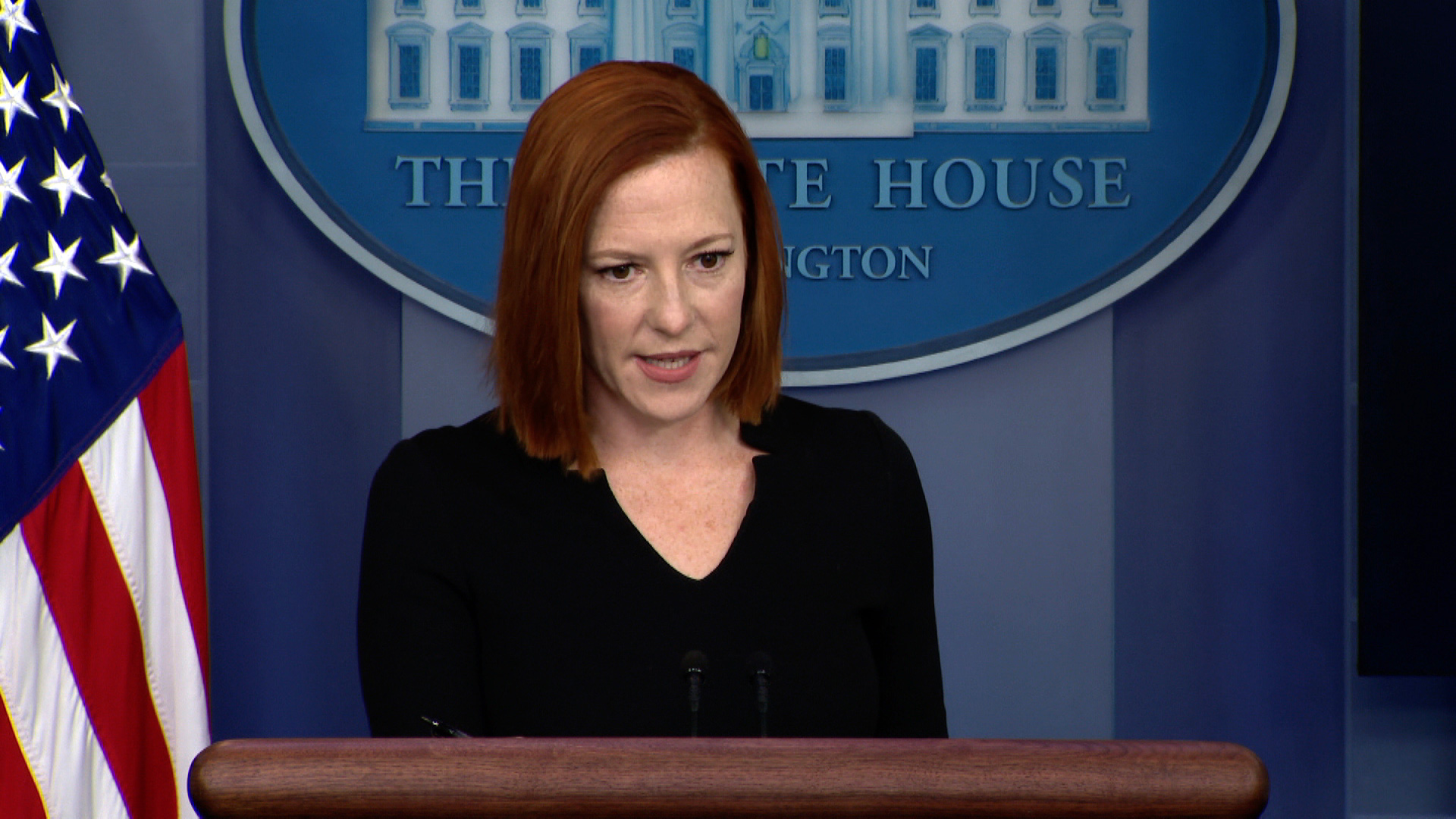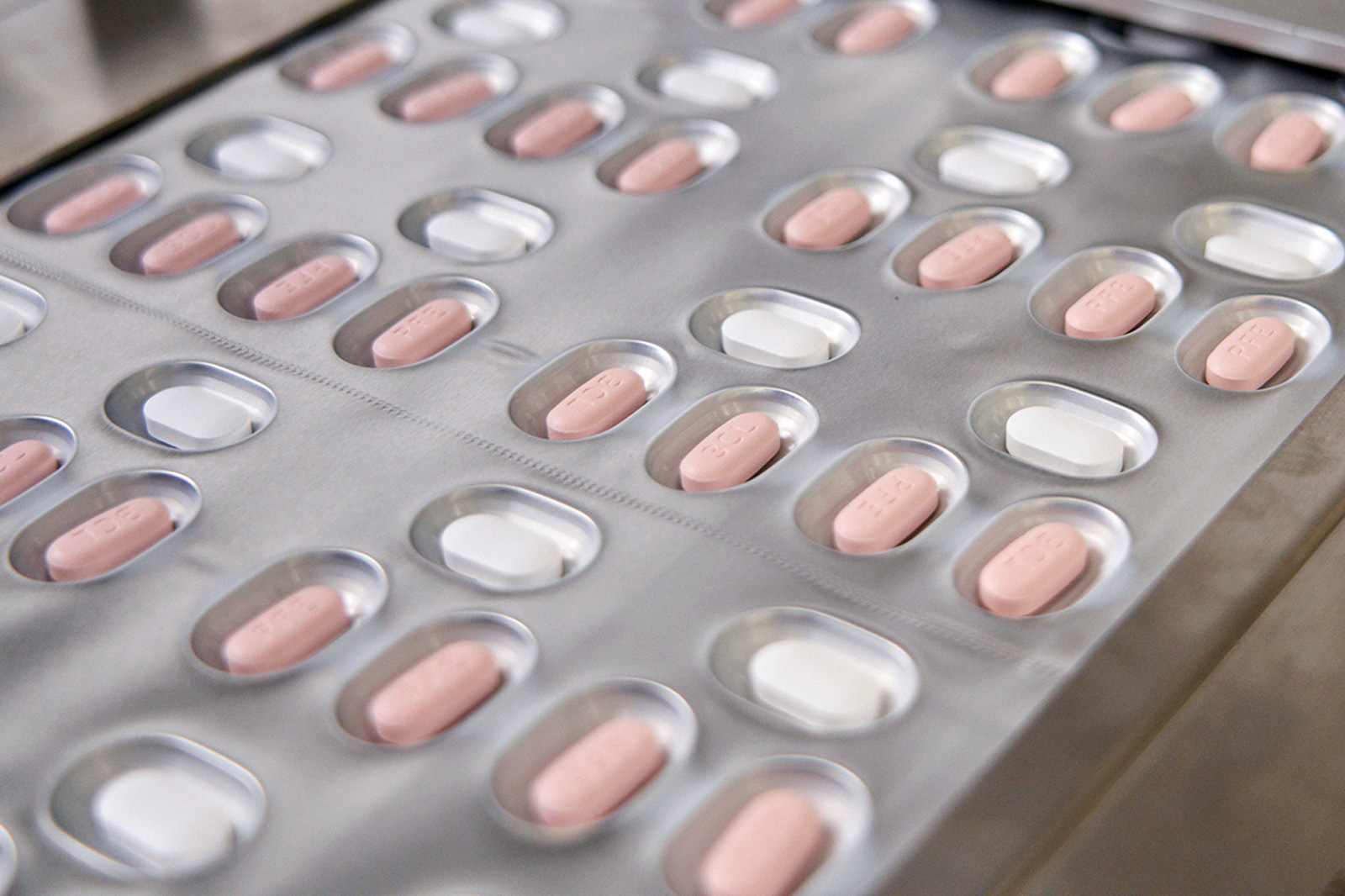
Omicron up to 3 times more infectious than Delta, CDC says

Omicron variant up to 3 times more infectious than Delta, CDC says
From CNN’s Maggie Fox
The Omicron variant of the coronavirus is up to three times more infectious than the Delta variant, the US Centers for Disease Control and Prevention said Tuesday.
The CDC included the estimate as part of an update to its guidelines on isolating after testing positive for the virus or quarantining after exposure to it.
“Preliminary data suggest that the Omicron variant is up to three times more infectious than the Delta variant,” the CDC says in the update.
“With the recommended shorter isolation and quarantine periods, it is critical that people continue to wear well-fitting masks and take additional precautions for 5 days after leaving isolation or quarantine,” it adds.
“Modeling data from the United Kingdom reinforce the importance of mask use; after the 5th day after a positive test, an estimated 31% of persons remain infectious,” the CDC said. It cites a pre-print study posted online on Dec. 24.
“Mask use and layered prevention strategies, such as receiving all recommended vaccination and booster doses, physical distancing, screening testing, and improved ventilation, are key to preventing COVID-19 and decreasing transmission,” the CDC continued.
For the estimate of transmissibility, the CDC cites a study published in the Journal of Medical Virology. Kimihito Ito of Japan’s Hokkaido University and colleagues used data including 758 cases of Omicron variant infection confirmed in Denmark. They developed a method to calculate the infectiousness of a variant based on how many times it is detected over a certain period of time.
“We have estimated the effective (instantaneous) reproduction number of Omicron as 3.19 times greater than that of Delta under the same epidemiological conditions,” they wrote in the report.
“Theoretically, the enormous advantage of transmission can stem from two independent factors, (i) intrinsically greater transmissibility of Omicron compared to that of Delta, and (ii) substantial capacity of Omicron variant to escape from existing population-level immunity conferred either naturally or by vaccination,” they added.
The UK study, posted on the online server MedRxiv, was done by the UK Health Security Agency and was a modeling study done to support earlier release from isolation.
One table in that paper shows estimates that 31% of people would still be infectious on day five after a test. By day six it’s 22% and by day seven it’s 16%. “The current 10-day isolation period results in the release of 5% of the infected population being released from isolation whilst still being infectious,” the researchers wrote. They advocated for a seven day isolation period.
Cloth masks still OK to use against Omicron variant, CDC says
From CNN’s Maggie Fox
Cloth masks are still OK to use to protect against the Omicron variant of the coronavirus, so long as they are well-fitted and filter the air properly, the US Centers for Disease Control and Prevention says.
The CDC referred to its existing guidance on mask use in updated recommendations for isolation after a positive Covid-19 test and quarantine after exposure.
It says people should wear masks after testing positive and isolating for five days to protect others, because people may remain infectious for up to 14 days after a positive test.
“Masks are designed to contain your respiratory droplets and particles. They also provide you some protection from particles expelled by others,” the CDC notes in Tuesday’s update.
In a question and answer, the CDC provides links to its guidance suggesting what types of masks work best. Although several medical experts have said in recent days that cloth masks do not provide good protection, the CDC says they can.
“Can I remove my mask in public places after the end of isolation/quarantine? No. After your 5 days of quarantine or isolation end, you should continue to wear a well-fitting mask when around others at home and in public for 5 days. Refer to current CDC guidance for mask wear to determine what to do after the 10-day period is complete. In areas of substantial or high community transmission, masks should continue to be worn in public indoor settings,” the new guidance reads.
All masks should fit snugly so air does not escape around the edges of the mask but is filtered through the material, the CDC said. All masks should have wire to fit the mask tightly across the bridge of the nose. Cloth masks should have multiple layers of fabric, the CDC said.
Using a cloth mask over a disposable surgical style mask can provide good protection, the CDC said. The CDC recommends holding cloth masks up to the light and says that if light shines through, it’s too thin.
CDC releases updated Covid-19 isolation guidance. Here’s a look at the changes.
From CNN’s John Bonifield, Kaitlan Collins and Katherine Dillinger
The US Centers for Disease Control and Prevention on Tuesday updated its guidance on the recommended Covid-19 isolation period, telling people that if they have access to a Covid-19 test and want to take it, the best approach is to use a rapid test toward the end of their five-day isolation period.
The agency has faced pressure over the past week from outside medical experts to include a testing component in its new shortened isolation period.
The updated recommendations do not advise a test for isolated people, but they offer guidance on how those people should respond to a test result if they choose to take one:
- If the test is positive, isolated people are advised to continue their isolation until 10 days after their symptoms started. If the test is negative, isolated people can end their isolation but are advised to wear a mask around other people until day 10.
- The recommendations advise people who are isolating to avoid places where they can’t wear a mask, such as restaurants and gyms, and to avoid eating around others until day 10.
- People who are isolating are now urged to wait to travel until at least 10 days after the start of symptoms. Those who must travel on days six to 10 should wear a mask for their entire trip.
The CDC says the changes aim to “focus on the period when a person is most infectious. … These updated recommendations also facilitate individual social and well-being needs, return to work, and maintenance of critical infrastructure.”
CDC Director Dr. Rochelle Walensky foreshadowed the updated guidance Monday night on CBS’ “The Late Show.”
“So, if you have access to a test, and if you want to do a test at day five, and if your symptoms are gone and you’re feeling well, then go ahead and do that test. But here’s how I would interpret that test. If it’s positive, stay home for another five days. If it’s negative, I would say you still really need to wear a mask. You still may have some transmissibility ahead of you. You still should probably not visit grandma. You shouldn’t get on an airplane. And you should still be pretty careful when you’re with other people by wearing a mask all the time,” Walensky said.
More context on the CDC guidance: The updated guidance advising people to stay isolated until day 10 if they have a positive rapid test after five days in isolation appears to contradict Walensky’s claim to CNN last week that “we wouldn’t change our guidance based on the result of the rapid test.”
Walensky had steadfastly defended the agency’s decision not to include recommending a rapid test in the new guidance, telling CNN last week, “We opted not to have the rapid test for isolation because we actually don’t know how our rapid tests perform and how well they predict whether you’re transmissible during the end of disease.”
On CNN on Sunday, Dr. Anthony Fauci said the “likelihood of transmissibility is considerably lower” in the second half of the 10-day period following a positive result.
Walensky has also maintained that the CDC’s decision to not include a testing recommendation had nothing to do with the nationwide shortage of rapid tests.
“This decision really, from an isolation standpoint, had everything to do with the fact that we wouldn’t change our guidance based on the result of that rapid test. And you know that it didn’t have anything to do with any shortage at all, because we recommend rapid tests for those in quarantine,” Walensky said.
Despite that, there has been deep frustration inside the Biden administration in the days since the CDC announced that it was shortening the isolation period for those who test positive for Covid-19 from 10 days to five with no testing component, according to multiple officials.
French president tells newspaper his goal is to “piss off” the unvaccinated
From CNN’s Dalal Mawad in Paris

French President Emmanuel Macron said he “really wants to piss off” the unvaccinated, in an exclusive interview with Le Parisien newspaper on Tuesday.
“I’m not for pissing off the French. I rant all day at the administration when it blocks them,” Macron said, referring to his disdain for how bureaucracy often gets in the way of the French people.
“Now the unvaccinated, I really want to piss them off. And so, we’re going to keep doing it, until the end. This is the strategy,” Macron added.
Macron went on to say there will be no severe punishment – such as jail time – for the unvaccinated, but their status could limit their lifestyle and access to restaurants, travel and more from mid-January, if a bill currently being debated in parliament is approved.
“I’m not going to put them in jail, I’m not going to forcibly vaccinate them, and so, you have to tell them: from January 15, you will no longer be able to go to the restaurant, you will no longer be able to have a drink, go for a coffee, to the theatre, you will no longer go to the movies,” Macron said.
The proposed legislation would replace France’s health pass with a vaccine pass, making proof of vaccination necessary for access to a range of everyday activities, from entering restaurants and bars to traveling inside the country.
First introduced last July, the health pass is a pillar of President Macron’s Covid-19 strategy, aimed at pushing people in France to get vaccinated.
Macron described those opposed to vaccination as “irresponsible” adding that “they undermined the strength of a nation.”
“When my freedom threatens that of others, I become irresponsible,” he said, “an irresponsible person is no longer a citizen.”
Pace of US Covid-19 vaccinations is half of what it was a month ago, CDC data shows
From CNN’s Deidre McPhillips
Here’s a look at the latest data on vaccination efforts in the United States, published Tuesday by the US Centers for Disease Control and Prevention:
- Fully vaccinated: 62.2% of the total US population (all ages), about 207 million people
- Not vaccinated: at least 21.6% of the eligible population (age 5+) have not received any dose of Covid-19 vaccine, at least 67.5 million people
- Current pace of vaccinations (seven-day average): 1,093,005 doses are being administered each day
- That’s nearly half of what it was a month ago.
- Most doses being administered – about 623,000 – are booster doses.
- Only about 305,000 people are initiating vaccination each day.
- About 71.6 million people have received a booster dose
- About 22% of the total US population is now fully vaccinated and boosted.
- The pace of booster dose administration ticked up amid the early spread of the Omicron variant but has since trailed off.
Note: CDC data on Covid-19 vaccinations is an estimate. The agency notes that data on people who are fully vaccinated and those with a booster dose may be underestimated, while data on people with at least one dose may be overestimated.
Here’s how the seven-day average of new administered vaccine doses compares over time, according to CDC data.

White House is “finalizing the contracts” for free Covid-19 test kits for Americans, press secretary says
From CNN’s Nikki Carvajal

Additional details are coming “soon” on a plan to allow Americans to request free test kits online from the federal government, the White House said Tuesday.
The Departments of Defense and Health and Human Services are already working on an “accelerated contracting timeline,” White House press secretary Jen Psaki told reporters in an afternoon press briefing.
She said the request for proposal, or RFP, which “allows us to best understand logistics timing and manufacturing considerations,” is closed as of Tuesday.
“We are currently evaluating the responses to it, which means we are finalizing the contracts,” Psaki said.
“We’re on track to start seeing movement on some of the awards through the RFP this week. So the first deliver delivery for manufacturers will start later this month. That’s our expectation,” she continued. Once the tests are in hand, she said, the website will come online.
In remarks earlier in the day, President Biden admitted he was frustrated on the status of testing in the country, adding that “we should see waiting lines shorter, more appointments freed up.”
“I know this remains frustrating. Believe me it’s frustrating to me. But we’re making improvements in the last two weeks,” he said, claiming that drugstores an online websites are “restocking,” and pointing to a previously-announced federal initiative to have tests shipped to Americans who request them for free.
US military deploys 2 more medical teams to New Hampshire and New York to support Covid-19 relief
From CNN’s Michael Callahan
The US military is deploying two additional medical teams to New Hampshire and New York to assist FEMA to treat Covid-19 patients, the US Army North said in a statement Tuesday.
A 15-person team from the US Air Force will support Elliott Hospital in Manchester, New Hampshire, and another 20-person team from the Navy will assist the Erie County Medical Center in Buffalo, New York.
“Military medical personnel are just one of the many tools available to the nation to combat COVID-19 and save lives,” said Lt. Gen. John R. Evans, Jr., US Army North commander, said in a statement. “Our service members are working tirelessly in support of FEMA, and hand-in-hand with civilian partners, to provide additional support for hospitals facing capacity issues.”
The US military will now have 13 teams helping efforts across eight states: one in Arizona, one in Colorado, one in Indiana, four in Michigan, two in Minnesota, one in New Mexico, two in Pennsylvania, and one in Wisconsin.
Belgium reduces Covid-19 isolation and quarantine requirements
From CNN’s James Frater
Belgium is making changes to their testing, quarantine and isolation policies as the country is hit with an “exponential increase in Omicron infections,” the health authority, the Inter-Ministerial Conference on Health (IMC), announced Tuesday.
Modeling from the IMC expects the number of coronavirus infections to increase in the coming days and weeks and says, “the pressure on test administration and analysis capacities is becoming untenable.”
The new rules will come into effect on Jan. 10 and include a shortening of isolation and quarantine for those who are vaccinated.
Starting Monday:
- Belgians who are isolating – because they are sick or have tested positive for coronavirus – will have their isolation “shortened to seven days” from 10 days.
- This is followed by three days of additional measures where social contacts and social activities, such as eating dinner with other people, is not allowed.
- Citizens who are fully vaccinated or have received their booster shot within the last five months will no longer have to quarantine or take a PCR test after being a close – or “high-risk” – contact of someone who has Covid-19.
- But they should “apply strict preventive measures” which include: wearing a face covering and maintain social distancing for at least 10 days after coming in to close contact with an infected person, the IMC guidance said.
- People who are partially vaccinated will still have to quarantine for seven days after coming into close contact with someone who has coronavirus, but can end their quarantine from the fourth day if they present consistent negative results from self-administered daily tests.
- For those who are unvaccinated, they must quarantine for 10 days and take PCR tests on days one and seven. They can leave their quarantine on day seven by taking a daily self-test with a negative result.
These changes follow similar moves by other countries. In France and Spain, people infected with coronavirus now have to isolate for seven days instead of 10 and high-risk contacts have a reduced quarantine of five days.
CNN’s Sandrine Amiel and Al Goodman contributed to this report.
Biden: US doubling order for Pfizer’s antiviral pill to 20 million to be delivered in “months ahead”
From CNN’s Leinz Vales

President Biden announced Tuesday that he is directing his Covid-19 response team to work with drugmaker Pfizer to double the US order of its Covid-19 antiviral pill.
“I’m directing my team to work with Pfizer to double our order from 10 million to 20 million treatment courses to be delivered in the months ahead,” Biden said before he received a briefing from his team.
Last month, the US Food and Drug Administration authorized Pfizer’s antiviral pill, Paxlovid, to treat Covid-19, the first antiviral Covid-19 pill authorized in the US for ill people to take at home, before they get sick enough to be hospitalized.
“We may need even more,” Biden added. “That’s the estimate we need right now. We’ve already placed the largest order in the world. Now I’m doubling that order. These pills are going to dramatically decrease hospitalizations and deaths from Covid-19. They’re a game changer and have the potential to dramatically alter the impact of Covid-19, the impact it’s had on this country and our people.”
Some more context: It will take months to ramp up supply of Pfizer’s antiviral treatment for early Covid-19. With forecasts – by the US Centers for Disease Control and Prevention and others – that the Omicron surge could peak this month, this could mean the vast majority of courses arrive at a time when the variant is on the decline.
According to a statement posted last month to PHE.gov, “An initial 65,000 courses of Paxlovid will be made available for shipment to states and territories and will begin arriving at dispensing sites by the end of December.” The statement continues, “An additional 200,000 courses are expected in January, ramping up steadily in the months ahead.”
A statement by Pfizer Tuesday says that the delivery of the first 10 million courses “have been accelerated for delivery by the end of June,” and the second 10 million by the end of September.
CNN’s Michael Nedelman contributed reporting to this post.
Source: https://www.cnn.com/world/live-news/omicron-variant-coronavirus-news-01-04-22/h_471bfe70057410f69dfe22c568f9faef
















